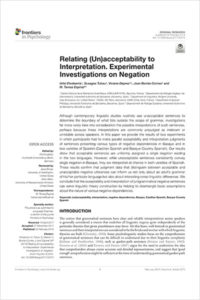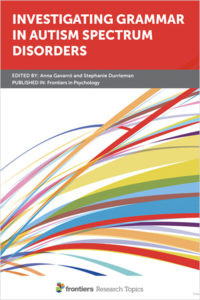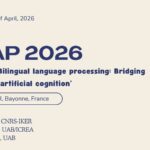16 setembre, 2019
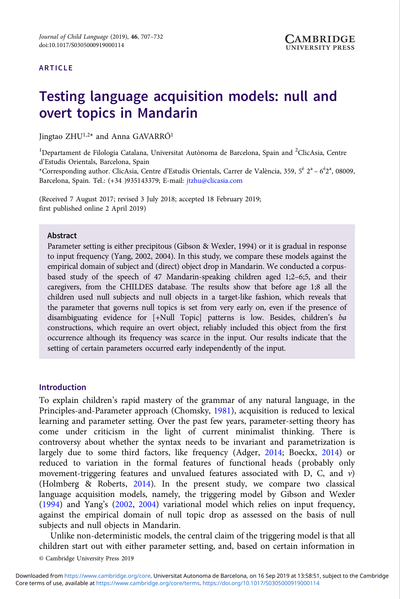
Autors:
Jingtao Zhu i Anna Gavarró
Títol:
Testing language acquisition models: null and overt topics in MandarinEditorial: Journal of Child Language, vol.46(4). Cambridge University Press
Data de publicació: Juliol 2019
Més informacióParameter setting is either precipitous (Gibson & Wexler, 1994) or it is gradual in response to input frequency (Yang, 2002, 2004). In this study, we compare these models against the empirical domain of subject and (direct) object drop in Mandarin. We conducted a corpus-based study of the speech of 47 Mandarin-speaking children aged 1;2–6;5, and their caregivers, from the CHILDES database. The results show that before age 1;8 all the children used null subjects and null objects in a target-like fashion, which reveals that the parameter that governs null topics is set from very early on, even if the presence of disambiguating evidence for [+Null Topic] patterns is low. Besides, children's ba constructions, which require an overt object, reliably included this object from the first occurrence although its frequency was scarce in the input. Our results indicate that the setting of certain parameters occurred early independently of the input.
8 juliol, 2019
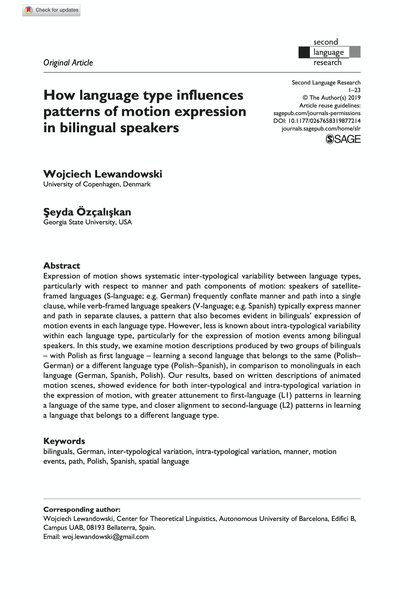
Autors:
Wojciech Lewandowski & Şeyda Özçalışkan
Títol:
How language type influences patterns of motion expression in bilingual speakersEditorial: Second Language Research
Data de publicació: 7 d'octubre de 2019
Més informacióExpression of motion shows systematic inter-typological variability between language types, particularly with respect to manner and path components of motion: speakers of satellite-framed languages (S-language; e.g. German) frequently conflate manner and path into a single clause, while verb-framed language speakers (V-language; e.g. Spanish) typically express manner and path in separate clauses, a pattern that also becomes evident in bilinguals’ expression of motion events in each language type. However, less is known about intra-typological variability within each language type, particularly for the expression of motion events among bilingual speakers. In this study, we examine motion descriptions produced by two groups of bilinguals – with Polish as first language – learning a second language that belongs to the same (Polish–German) or a different language type (Polish–Spanish), in comparison to monolinguals in each language (German, Spanish, Polish). Our results, based on written descriptions of animated motion scenes, showed evidence for both inter-typological and intra-typological variation in the expression of motion, with greater attunement to first-language (L1) patterns in learning a language of the same type, and closer alignment to second-language (L2) patterns in learning a language that belongs to a different language type.
2 desembre, 2019
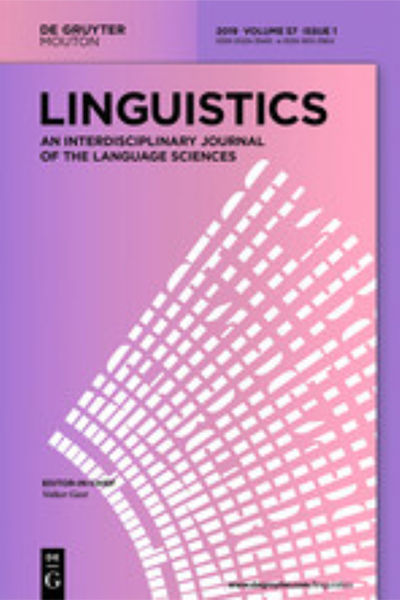
Autors:
Andreas Trotzke & Eva Wittenberg
Títol:
Long-standing issues in adjective order and corpus evidence for a multifactorial approachEditorial: Linguistics 57(2), 273-282
Data de publicació: 2 desembre 2019
Més informació
Text completIn this paper, we introduce the issue of adjective order and show that different approaches vary in their answers to the question of how fine-grained the semantic categories determining adjective order are. We report on a corpus study that we conducted and that illustrates that a clear answer to the question of what general factors exactly determine adjective order is elusive, given the multifactorial nature of the problem. We then present the individual contributions to this special issue, and how they attempt to add new observations from Germanic languages to the general issues revolving around the topic of adjective order.
17 desembre, 2019
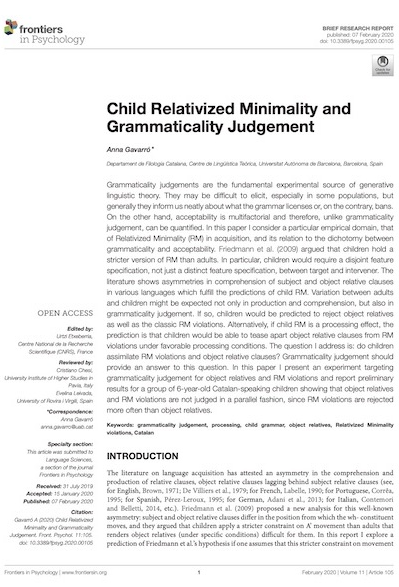
Autors:
Anna Gavarró
Títol:
Child Relativised Minimality and Grammaticality JudgementEditorial: Frontiers in Psychology, section Language Sciences
Col·lecció: Frontiers in PsychologyData de publicació: 7 de febrer del 2020
Més informació
Grammaticality judgements are the fundamental experimental source of generative linguistic theory. They may be difficult to elicit, especially in some populations, but generally they inform us neatly about what the grammar licenses or, on the contrary, bans. On the other hand, acceptability is multifactorial and therefore, unlike grammaticality judgement, can be quantified. In this paper I consider a particular empirical domain, that of Relativized Minimality (RM) in acquisition, and its relation to the dichotomy between grammaticality and acceptability. Friedmann et al. (2009) argued that children hold a stricter version of RM than adults. In particular, children would require a disjoint feature specification, not just a distinct feature specification, between target and intervener. The literature shows asymmetries in comprehension of subject and object relative clauses in various languages which fulfill the predictions of child RM. Variation between adults and children might be expected not only in production and comprehension, but also in grammaticality judgement. If so, children would be predicted to reject object relatives as well as the classic RM violations. Alternatively, if child RM is a processing effect, the prediction is that children would be able to tease apart object relative clauses from RM violations under favorable processing conditions. The question I address is: do children assimilate RM violations and object relative clauses? Grammaticality judgement should provide an answer to this question. In this paper I present an experiment targeting grammaticality judgement for object relatives and RM violations and report preliminary results for a group of 6-year-old Catalan-speaking children showing that object relatives and RM violations are not judged in a parallel fashion, since RM violations are rejected more often than object relatives.
Títols de la col·lecció / Also in this series:
17 desembre, 2019
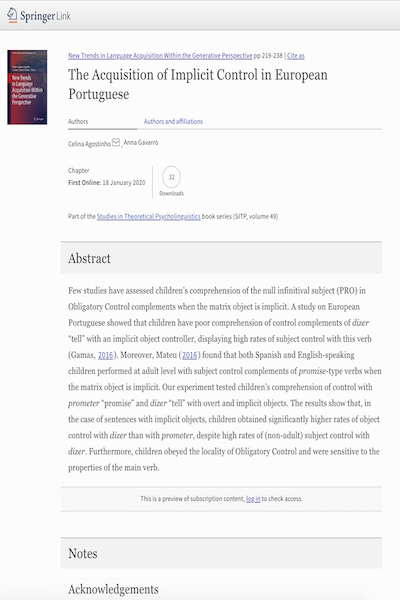
Autors:
Celina Agostinho & Anna Gavarró
Títol:
New Trends in Language Acquisition Within the Generative PerspectiveEditorial: Springer
Data de publicació: 18 de gener del 2020
Més informacióFew studies have assessed children’s comprehension of the null infinitival subject (PRO) in Obligatory Control complements when the matrix object is implicit. A study on European Portuguese showed that children have poor comprehension of control complements of dizer “tell” with an implicit object controller, displaying high rates of subject control with this verb (Gamas, 2016). Moreover, Mateu (2016) found that both Spanish and English-speaking children performed at adult level with subject control complements of promise-type verbs when the matrix object is implicit. Our experiment tested children’s comprehension of control with prometer “promise” and dizer “tell” with overt and implicit objects. The results show that, in the case of sentences with implicit objects, children obtained significantly higher rates of object control with dizer than with prometer, despite high rates of (non-adult) subject control with dizer. Furthermore, children obeyed the locality of Obligatory Control and were sensitive to the properties of the main verb.





